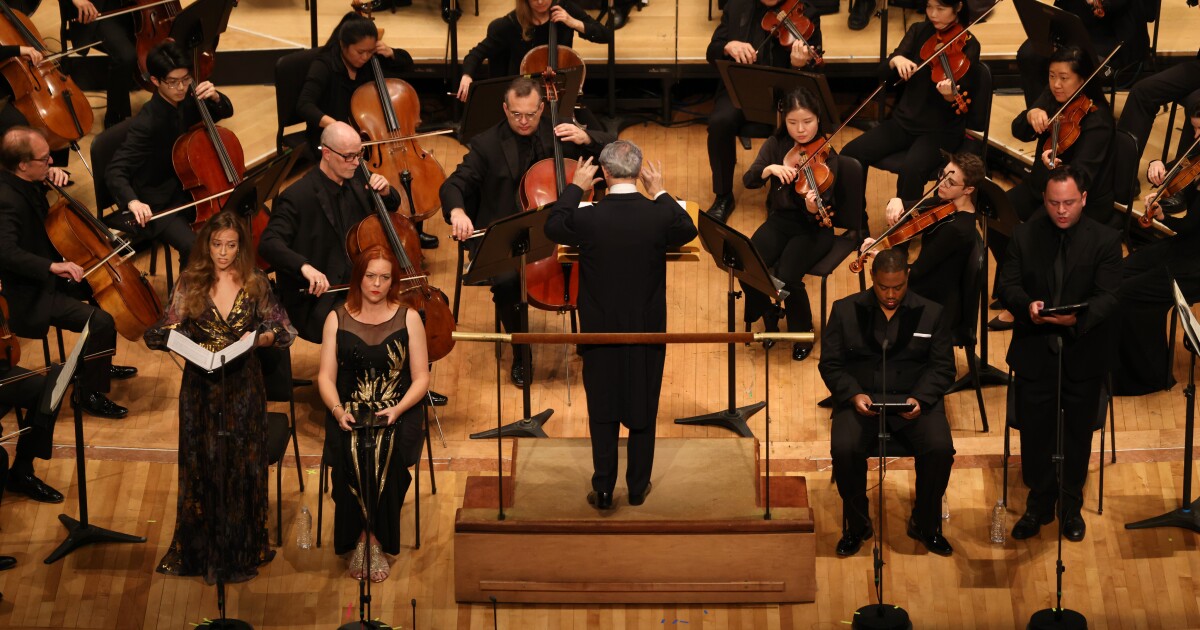Whale calls. Glaciers melting. Frog croaks.
These are sounds audiences might not expect in an orchestral concert hall but were featured in last week’s world premiere of Angélica Negrón’s For Everything You Keep Losing at the Dallas Symphony Orchestra.
The piece explores the loss of sound due to climate change, especially in Negrón’s native Puerto Rico. She grew up in Carolina on the east side of the island.
“I kept coming back to this idea of habitat destruction and just the kind of the loss of how the sonic landscape is shifting due to the climate crisis,” she said.
The piece, a requiem or composition for the dead, incorporates the sounds of a full orchestra, 160-person choir, four soloists, a MIDI keyboard and field recordings. The libretto references verses written by Negrón’s favorite Puerto Rican poets, including Roque Raquel Salas Rivera.
While the piece carries a lot of existential weight, Negrón was intentional about making it sound more meditative sonically.
“I wanted to find a balance between making something that focused on light, but at the same time acknowledged our fault in all these losses that we’ve had and … not ignoring that part of it, too,” she said.
The more than 30-minute long piece was commissioned by Dallas Symphony Orchestra conductor Fabio Luisi years ago. He said the piece also speaks more broadly to the universal idea of loss.
“It’s touching us somehow through this calm pace. Nevertheless it has a force, it has something very energetic, but a little bit hidden behind the words,” he said. Luisi said the meaning of the work “is something we all feel in our life, what we have lost, what we miss.”
Negrón said one of the challenges she faced in composing the piece was figuring out how to write about sonic loss without being as literal as having silence. She navigated around that by using field recordings, including some of Puerto Rico’s Yunque rainforest and of the coquí guajón, a rock frog native to Puerto Rico that’s been endangered since 1997 due to habitat loss.
Steve Hamm
/
The Dallas Morning News
Angelica Negron emerges from the side stage applauding the musical talents represented within the ranks of the Dallas Symphony Orchestra at the conclusion of DSO’s former composer-in-residence as she unveiled the world premier of a work for orchestra, chorus and vocalists in honor of the orchestra’s 125th anniversary, at the Meyerson Symphony Center in Dallas, on October 16, 2025.
Biologist David Haskell and marine biologist Elliot Ma shared field recordings for the piece. Ma, an acoustic research assistant at the Wildlife Conservation Society, collected sounds around a wastewater treatment plant along the Hudson River.
The quiet gurgling of water because of the absence of organisms, can be heard in the fourth movement of Negrón’s piece.
“Typically, I can find some fish noise or some snapping shrimp noise, depending on the site. But in that location, there was noticeably a lack of sound,” Ma said.
Ma said he’s increasingly concerned about the rollback of conservation efforts. He hopes Negrón’s piece can help create awareness about loss of biodiversity.
“When they’re gone, they’re gone. There’s no reintroduction. You lose that animal and you lose the sounds it produces. It’s very, very sad,” he said.
There are other forms of loss Negrón references in the piece as it relates to the climate crisis, such as the displacement of native people in Puerto Rico. Following Hurricane Maria in 2017, tens of thousands of Puerto Ricans relocated to the U.S. mainland, according to the U.S. Census Bureau.
“As someone from Puerto Rico, I also started to think about different ways that the climate crisis also intersects with disaster capitalism, the displacement of communities and colonialism,” she said.
In the piece’s sixth movement, Negrón cites text from poet Roque Raquel Salas Rivera as a singer belts out, “… with my friends in apartments with steep rent, NO PETS and NO LOCALS.”
Alejandro Granadillo
/
The Associated Press
FILE – Bad Bunny performs during the final concert of his summer residency in his homeland at the Coliseo de Puerto Rico Jose Miguel Agrelot, in San Juan, Puerto Rico, Sept. 20, 2025. (AP Photo/Alejandro Granadillo, File)
Negrón is among musical artists such as Billie Eilish, Joni Mitchell and Childish Gambino who have spoken about environmental issues through their music. She also joins Puerto Rican contemporary Bad Bunny, who has made the endangered crested toad, or sapo concho, an icon in his new album Debí Tirar Más Fotos. His spotlighting of the endangered animal has helped spur a wave of awareness and donations to preserve the toad at spots like the Fort Worth Zoo.
Marine biologist Ma said art has a way of more deeply connecting audiences with what’s going on in the natural world.
“You’ll never be able to appreciate the true biological diversity of an area unless you can actually hear it, unless you know it’s there,” he said.
That seems to be what Negrón and Bad Bunny are doing: finding ways to remember the precious Puerto Rican sounds that are so easily lost.
Arts Access is an arts journalism collaboration powered by The Dallas Morning News and KERA.
This community-funded journalism initiative is funded by the Better Together Fund, Carol & Don Glendenning, City of Dallas OAC, The University of Texas at Dallas, Communities Foundation of Texas, The Dallas Foundation, Eugene McDermott Foundation, James & Gayle Halperin Foundation, Jennifer & Peter Altabef and The Meadows Foundation. The News and KERA retain full editorial control of Arts Access’ journalism.

